- Home
- Brian Hodge
Picking the Bones
Picking the Bones Read online
Table of Contents
Title Page
Copyright Page
With Acknowledgements to Sun Tzu
If I Should Wake Before I Die
The Passion of the Beast
De Fortuna
The Firebrand Symphony
Brushed In Blackest Silence
Pull
An Ounce of Prevention is Worth a Pound of Flesh
And They Will Come in the Hour of Our Greatest Need
Re Your Application of 55
Where the Black Stars Fall
When the Silence Gets Too Loud
Guardian
Hate The Sinner, Love The Sin
A Good Dead Man is Hard to Find
Our Turn Too Will One Day Come
When the Bough Doesn't Break
Cemetery Dance Publications
DH Digital Editions
PICKING
THE
BONES
by Brian Hodge
Cemetery Dance Publication
Baltimore
2012
Picking The Bones © 2011 Brian Hodge
With Acknowledgments To Sun Tzu © Brian Hodge, 2003. First appeared in The 3rd Alternative magazine.
If I Should Wake Before I Die © Brian Hodge, 2005. First appeared in Outsiders.
The Passion of the Beast © Brian Hodge, 2007. First appeared in Midnight Premier.
De Fortuna © Brian Hodge, 2002. First appeared in The 3rd Alternative magazine.
The Firebrand Symphony © Brian Hodge, 2002. First appeared in The Children of Cthulhu.
Brushed In Blackest Silence © Brian Hodge, 2004. First appeared in The Many Faces of Van Helsing.
Pull © Brian Hodge, 2002. First appeared in The Darker Side.
An Ounce Of Prevention Is Worth A Pound Of Flesh © Brian Hodge, 2004. First appeared in A Walk On The Darkside.
And They Will Come In The Hour of Our Greatest Need © Brian Hodge, 2007. First appeared in A Dark And Deadly Valley.
Re: Your Application of 5/5 © Brian Hodge, 2009. Original to this edition.
Where the Black Stars Fall © Brian Hodge, 2003. First appeared in Hot Blood XI: Fatal Attractions.
When the Silence Gets Too Loud © Brian Hodge, 1995. First appeared in Cemetery Dance magazine.
Guardian © Brian Hodge, 2006. First appeared online at Horror World web site.
Hate the Sinner, Love the Sin © Brian Hodge, 2009. Original to this edition.
A Good Dead Man Is Hard To Find © Brian Hodge, 2009. Original to this edition.
Our Turn Too Will One Day Come © Brian Hodge, 2006. First appeared in Alone On The Darkside.
When the Bough Doesn’t Break © Brian Hodge, 2004. First appeared in Damned: An Anthology of the Lost.
All rights reserved. No part of this book may be reproduced in any form or by any electronic or mechanical means, including information storage and retrieval systems, without permission in writing from the publisher, except by a reviewer who may quote brief passages in a review.
Cemetery Dance Publications
132-B Industry Lane, Unit #7
Forest Hill, MD 21050
http://www.cemeterydance.com
The characters and events in this book are fictitious. Any similarity to real persons, living or dead, is coincidental and not intended by the author.
First Digital Edition
ISBN: 978-1-58767-348-1
Cover Artwork © 2011 Vincent Chong
Digital Design by DH Digital Editions
[email protected]
WITH ACKNOWLEDGEMENTS TO SUN TZU
When people find out what I do, and if we end up chatting long enough, I always know what's coming eventually. They can't help it. Sooner or later they won't be able to resist asking what's the worst thing I've ever seen.
"You don't want to know," I'll tell them. "Really. You don't."
I may have to repeat it a time or two, but this nearly always takes care of the situation. Like by this time they've started to notice the cues. How I'm not even close to smiling, the way I might if I was making them beg for it. My voice, too. It's accrued a lot of damage from cigarettes and drink over the years, so much so that somebody once told me that my voice reminded them of graveyards…which fits, because I've been through so many of them. The kind that have no gates.
Whatever it is that does the trick, these people seem to end up convinced: Maybe they really don't want to know the worst thing I've ever seen.
I'm not sure I could even give an honest answer. I've probably blocked it out so well that it would take a hypnotist to drag it back into the light of day.
"You're joking, right?" someone might ask, if I gave him a chance to get that far. "Why would it take a hypnotist when you've got the pictures? Whatever it was, you took pictures, didn't you?"
Fuck no. Who'd publish them? I'm not a pornographer. The kind of people who would want them, I'd never want to meet. Just as I would never take them to keep only for myself.
And when people find out the places I go, they often ask what it's really like there. Because they understand that, no matter how thoroughly photographs and film might document a war, no matter what juxtapositions of savagery, poetry, and loss they might convey, photographs and film never tell the whole story.
Sometimes they can't even contain what they do capture. I still remember the blue-black night skies over the deserts of Kuwait and Iraq during the Gulf War. Because the land was so flat and featureless, the skies pushed the horizons as low as they could go, and after dark they filled with such a depth of stars that to stand and look into them for long left you feeling unmoored from the ground beneath your feet. No photo I shot then came close to capturing the immensity of an Iraqi night.
Can any one photo, then, come close to capturing the symphony of ruin that is the city of Baghrada?
Probably not, although I shuffle through them anyway, trying to imagine their destiny, how they will look in the pages of National Geographic.
I can see only their inadequacies. No matter how much suffering is conveyed by the ravaged eyes and architecture, no matter how much empathy they arouse, no matter how fast you run to your checkbook to write a donation for the refugees, still…to me, it's only surface now. Only pigment and paper.
Because if Baghrada isn't necessarily the place of the worst thing I ever saw, it's the place of the worst thing I ever learned.
*
We arrived in late September, the days still warm but the evenings turning cold. From our various parts of the globe, we'd all flown into Budapest, then cobbled together hasty travel arrangements and drove in across the border—got ourselves smuggled in, more like it, paying sympathetic locals to help get us in without attracting attention. It's been the way of mass murder ever since the rise of mass media: Whichever side is committing the worst atrocities is the one that doesn't want the story told to the rest of the world.
Five of us, ours was a union of mutual support and convenience, an alliance of acquaintances, friendships, and sporadically-entwined histories that went back as far as twenty-odd years. Doolan and I went back the longest, the two of us having met as younger daredevils in Peshawar, Pakistan, during the Soviet occupation of Afghanistan. It had been his first time out of Australia, and the two of us shared a room in the Khyber Hotel, a one-star pisshole that served as base camp for lots of foreign journalists before jumping over into the war zone. Both blond-haired and fair-skinned, we spent our last night there dyeing our hair and our new beards and even our skin, until we looked as native as we could, because the Russians had set a bounty on the heads of war correspondents. The next morning Doolan and I put our hangovers behind us and set off across the border to link up with the Mujahideen rebels and follow the pro
gress of their campaign in the Panshjir Valley.
Then there were the Barnetts, Lily and Geoff, freelance filmmakers based in London, who did a lot of assignments for the BBC. Doolan had gotten to know them first, a few years after he met me, running across the pair of them as newlyweds spending their honeymoon in the El Salvador of the mid-1980s.
Midori we'd known the least amount of time. She and I had met a few years earlier in the tribal slaughtergrounds of Rwanda. I was already familiar with her photographs, so to me it was like meeting a celebrity, although what eventually amazed me most was the quiet courage inside this tiny woman. Not just for the way she would run toward the places everyone else was running away from—we all did that—but for how much heart it must've taken her to pursue a life so alien to what had been expected of her by her family and culture in Osaka.
Our transportation to Baghrada was in two trucks, relics from earlier decades, and we captured images while on the roll. Now and again we would come across the remains of ambushed convoys littering the otherwise peaceful countryside, the kind of vintage trucks and other military leftovers that are the usual rule in Eastern Europe. Most had been reduced to burnt-out hulks, manned by scrappy tatters that had once been human beings, hardly fit for burial anymore, just continued gnawing by animals. Some were by now nothing more than grimy skeletons, joints wrenched apart by explosions or scavengers.
We'd all seen enough of these sights to take them in stride, although they still seemed to make our drivers nervous. Stocky, bearded men who'd brought meals wrapped in cloth, they would furtively scan hedgerows and treelines and hillsides for threats. Back in America they would've been working in factories, in power plants, driving busses. Here, they were taking risks for enough pay to assure them of being able to feed their families for the coming winter.
Of course we took their pictures too.
We were safe enough, I figured, the road to Baghrada running two hundred kilometers through territory secured by the insurgent army that had risen up against Codrescu's regime. But the closer we drew to the city, the less it seemed to matter. It was as though we were driving into a vast corpse, and even if we weren't harmed by what had actually killed it, the decay would be sure to get us in the end.
"You ever stop and wonder," Doolan said, "why some places just seem to be magnets for this sort of business?"
He'd done his homework, obviously. He knew.
Situated between a river and mountains mined for ores, Baghrada has been of strategic or economic value to over a millennium's worth of marauders. At one time or another it has been set upon by Mongols, Ostrogoths, Saxons, Ottoman Turks, French, Serbs, Germans, Russians, and probably by armies that history has forgotten. Thirty years ago they even found evidence of a Viking settlement there, although by all indications it had thrived in peace. Someone has always wanted Baghrada. It is a city with thousand-year-old scars, and as we came upon it, we saw that the wounds had been laid open once again.
Its peacetime population had climbed toward a quarter-million, but it would be some time yet before anyone might calculate what it had been reduced to. From a distance, only the smoke seemed alive. Lazy plumes rose into the sky or smudged against the tops of surviving spires and towers, wafting in the wake of the artillery barrages that had driven Codrescu's soldiers into retreat. The fires beneath the rubble might burn for months, a mixed blessing over the coming winter, with the poorest of the poor willing to blacken their lungs for the privilege of huddling against a warm heap of bricks.
Twice we went through checkpoints—once for free, the other time needing to bribe our way past, paying tribute to scruffy men in woolen vests, the impromptu peasant uniform of the rebel militia. Most of them carried Russian-made AK-47s slung from their shoulders with an insolent ease.
Deeper into Baghrada, its bones came into view. Buildings raised centuries apart had been blasted together, sides or ends collapsing and the husks jutting with oak beams, steel girders. People still lived inside the raw shells, at least in the more stable ones, second and third and fourth floors like platforms now, stages on which families waited and watched, hoped and prayed, their daily subsistence turned into the dioramas of museum exhibits.
It sometimes shames me to admit that I've always found a grotesque beauty in devastation. Seared landscapes and charnel fields and cities that lie writhing for block after pulverized block, they're all works of art in…whatever is the opposite of progress.
And yet, in the midst of it, life continues. Beauty—true beauty—endures. Grass as green as Ireland sprouting against the sooty gray of broken masonry. A fresh-cut rose laid by an unknown hand atop bricks, as if to remind them what red really is. An old man, one eye turned milky blue by a cataract, taking the gift of a sandwich in his tobacco-yellowed fingers and ripping it in half to share it with his droop-tailed dog.
The lens sees all, passing no judgment but approval.
*
On the First Day of Creation, according to a very old story, God divided the darkness from the light, and called the light good.
No recorded value judgment on the darkness this early in the experiment, although it appears to have acquired a bad rap soon after.
But photographers, at least, have been grateful for the act ever since.
*
After we stowed our gear in our hotel rooms—which brought back fond memories of the Khyber, Doolan joked—all five of us headed for the roof. Something we always did naturally. Everybody seeks high ground in wartime.
From this lookout, beneath an evening sky as gray as slate, we scanned what remained after the latest onslaught upon Baghrada. We looked down upon nearby streets and distant roads, and the scattered signs of life within. Death too. Always death. Death doesn't just walk in these places—it swaggers. We watched workers using makeshift gurneys to carry three bodies exhumed from rubble; from elsewhere came the inconsolable wail of an unseen woman in mourning, until she was drowned out by the faraway chop of helicopter blades, the staccato chatter of small-arms fire.
And God help us all, tired as we were, for the way we perked up at that. We wanted to be there.
The Barnetts were filming already, camera balanced on Geoff's shoulder and Lily doing an impromptu voiceover. She's always had this way of looking camera-ready even after two hundred kilometers of rough road. And as I watched them work, I suppose it was not without envy.
Eventually the two of them, and Doolan as well, went back down to leave me alone with Midori.
"Why don't you marry her?" Doolan had asked me in Budapest, before her plane had arrived. "By now you're probably the last two people left on earth that could actually live with each other."
"It's not for failure to ask," I'd told him.
"What's that prove?" he'd said. "Asking's always come easy to you."
True enough. Over the past twenty years, three other women had already said yes. Then they'd all eventually said forget it. Nothing against them. The fault was clear. It wasn't so much the danger—during my entire career I'd been wounded only once, although close calls hardly come any closer. A piece of Russian shrapnel had sliced a chunk from the back of my neck. A different angle and it could've chopped out vertebrae and spinal cord.
Instead, my marital failures came from having doomed myself to a life of restlessness no matter where I woke up. Whenever I was home, I was itching to be out in the field. But after I got there, I missed whoever and whatever I'd left behind so much that it was like a toothache. Whatever happiness I was chasing around and around, it felt like I was always 180 degrees on the other side of the circle from it.
So they left us alone, Midori and me. Because, in close quarters, you really can't keep much of anything a secret from anybody.
We'd held each other in some strange places. A rooftop in Baghrada and the smoke from a dozen distant fires were as normal to us as parks and fountains would be to normal people. Then we always ended up going our separate ways. Even though I still dreamed that one day the same window and i
ts unchanging view would finally be enough for us.
"I never told you," she said. "The day the World Trade Center was attacked, I was in San Francisco."
"You should've called me." Because Midori had never seen where I lived in Seattle. Just as I'd never seen her apartment in Tokyo.
"I had planned to. But then that happened, and I realized we both would be going to Afghanistan soon. And that that would seem more real."
I knew what she was really saying: that neither of us could have enjoyed the other when we both knew the kind of war that was imminent.
She pointed at one of the nearest smoke plumes, followed its climb with her finger.
"After the attack, those cheap newspapers you have in the queues at markets, on their covers they showed photos of the burning towers. But they'd retouched the clouds of smoke so it appeared that devil faces were in them. I thought it was such a shameful lie at the time. But maybe in that there was a kind of truth after all."
"I thought Shinto didn't believe in the devil."
"The world is bigger than Shinto. I don't know what to believe."
I nodded, because there were times I had sensed it too, walking upon bloody streets or battlefields and recognizing with painful acuity that here was a place bereft of anything remotely resembling God. Instead, a void had been left.
Rarer, but worse, were the times when even the void seemed absent, because something else had filled it with a lingering residue of terrible purpose. There had been times when I'd focused upon slaughter with one eye toward truth and the other toward aesthetics, and it was as though something had been peering over my shoulder, looking at the same scene, the way a bricklayer might stand back to inspect his pattern.
I heard the snap of a shutter, fell back into the here and now to see that Midori had just taken my picture. I always found it hard to tell her not to do that, because it felt like bad luck. Not that she would've listened. To her, war has all kinds of faces. And to me, she'd always been a small force of nature with a mop of glossy black hair, as immovable as a rock in her determination, and her age a secret, in that way of Asian women.

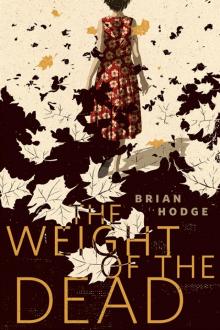 The Weight of the Dead
The Weight of the Dead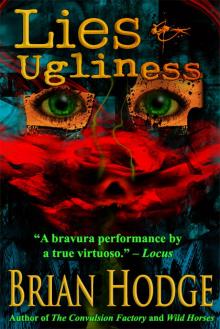 Lies & Ugliness
Lies & Ugliness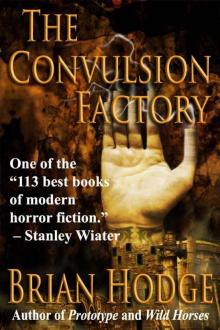 The Convulsion Factory
The Convulsion Factory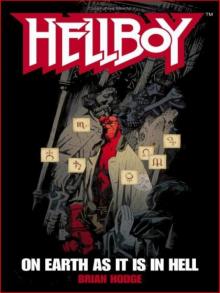 Hellboy: On Earth as It Is in Hell
Hellboy: On Earth as It Is in Hell Whom the Gods Would Destroy
Whom the Gods Would Destroy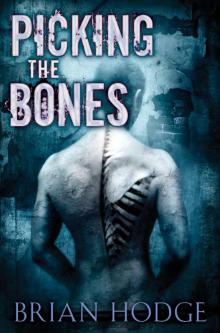 Picking the Bones
Picking the Bones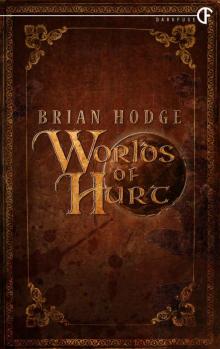 Worlds of Hurt
Worlds of Hurt Oasis
Oasis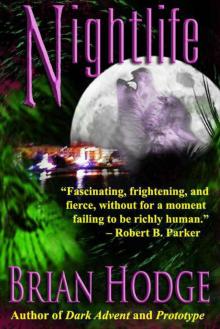 Nightlife
Nightlife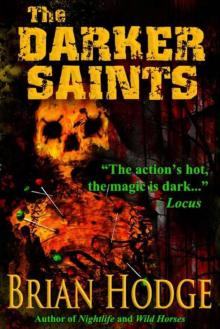 The Darker Saints
The Darker Saints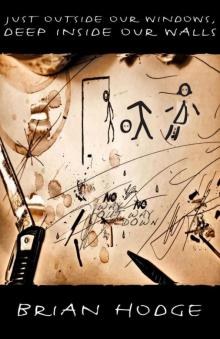 Just Outside Our Windows, Deep Inside Our Walls
Just Outside Our Windows, Deep Inside Our Walls A Haunting of Horrors, Volume 2: A Twenty-Book eBook Bundle of Horror and the Occult
A Haunting of Horrors, Volume 2: A Twenty-Book eBook Bundle of Horror and the Occult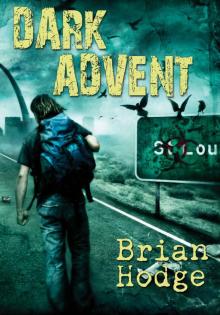 Dark Advent
Dark Advent Mad Dogs
Mad Dogs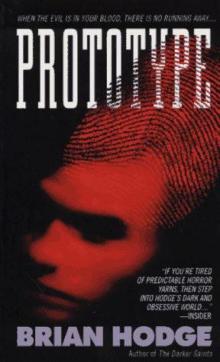 Prototype
Prototype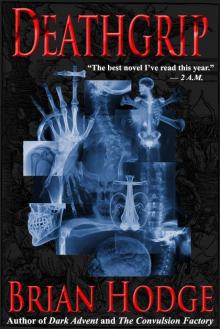 Deathgrip
Deathgrip Falling Idols
Falling Idols